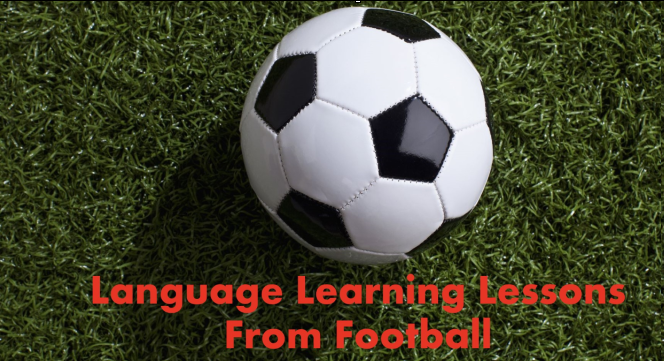- Home
- Voices about the English Language
- Language Learning and Football: What Football Taught Me About Language Learning and Teaching?
Language Learning and Football: What Football Taught Me About Language Learning and Teaching?

Dylan Gates is a teacher educator, materials designer, and communication skills trainer based in Spain. He is an advocate for a more learner-centred approach to language training and believes effective teachers need to be responsive and able to improvise to meet their learners' emerging needs. When he's not working, he spends his time playing his ukulele, reading crime fiction, and going for a run. Email: dylgates@hotmail.com

The older I get, the more I realise how much I’ve learned about life from playing, watching, talking, and thinking about football.
Whenever I search for an analogy, I choose one related to the beautiful game.
And language learning is no exception.
Acquisition
I clearly remember the first time I saw a football match on TV. It was Sunday lunchtime and the blue team (Chelsea) beat the red team (Liverpool). As my favourite colour was dark blue, I became a fan of the blue team.
Nobody told me what was going on, yet I understand the objective of the game. Work together with your team to put the ball in the back of the net. Stop the other team from doing the same.
On Monday morning, I went to school and finally realised what the group of boys in the playground did every day. I sat on the sidelines and watched as a flow of kids ran one way then the other, occasionally falling over each other in the process.
A few days later, I tentatively joined in and felt an instant rush of adrenalin as we chased after a plastic sphere bouncing unpredictably on the ground and off various parts of the body.
At first, I had no idea what to do, but I observed and tried to do what the other boys were doing. I was a fairly agile kid so I improved quickly. A few weeks later, I was one of those boys who played football in the playground. I made some new friends and we talked about the games we played. We collected football stickers, talked about our favourite players, and boasted about our feats of skill in the playground.
Looking back, nobody really taught me the rules of football. I just picked them up through observation. Of course, I probably asked friends for clarification but most of my learning was implicit.
Skills development
As for playing football, I learned by doing. Again, friends showed me techniques and tricks, but I had to learn them myself. My skills improved through playing competitive games and practicing routines with my pals. On top of that, I got a ball for Christmas and spent hours playing keepy-uppy in the back garden.
So, in a nutshell, I acquired knowledge about the game through observation (analogous to input in language learning) and developed skills by doing (analogous to output tasks and meaningful communication activities).
But, more than anything, I think we can draw an analogy between playing football and participating in conversations.
Football as conversation
Think about it.
When I played football by myself, it was like intrapersonal communication or self-talk.
When I played football with another person (my brother, my best friend), it was like interpersonal communication for exchanging ideas and information.
When I played football with my team, it was more transactional and purpose-driven.
Conversations are collaborative and co-constructed just like a team playing together with a shared goal of winning or not losing. In addition, competitive games are more like a high-stakes negotiation, although generally of the zero-sum rather than win-win variety.
Conversations are often confrontational and there is a continuous battle for territory and turn-taking. Again, just like a competitive game of football.
In a conversation, language is used like a football in a match, moving between participant to participant in a complex, dynamic, and unpredictable process of giving and taking. All the while, the participants are responding, reacting, and adjusting to what is happening and simultaneously planning their next move.
But, playing football - just like participating in conversation - doesn't always need to be antagonistic. As a kid and young adult at university, I spent hundreds of hours with friends playing keepy uppy; a game in which the aim is to see how long you can keep the ball in the air. This is the football equivalent of making small talk and socialising. No winners or losers; just a way to build and strengthen relationships.
The teacher as football coach
So, to draw one final analogy. My experience as a language teacher can also be compared to certain roles in football. Firstly, I have often been the MKO (More knowledgeable other) who is able to guide my learners into developing some aspect of their linguistic knowledge or communicative skills. This compares with those older boys who I played with and learned from. Secondly, when I played for my school team or local clubs, there was always a more traditional teacher-figure, a coach or trainer who provided us with specific training and feedback. Finally, every competitive game needs a referee who ensures that rules and procedures are followed just like a teacher setting up and managing classroom tasks and activities.
Conclusion
Learning to play football can certainly be compared to learning to use a language. Of course, no analogy is perfect but I hope both language teachers and football coaches would agree that the role of implicit learning (learning by doing) plays a more important role than explicit instruction.
I’d like to leave you with one final analogy.
When you watch a football game in a public space, there is always one opinionated ‘armchair expert’ showing off their ‘knowledge’ about the sport. Invariably, these people trip over their feet anywhere near a football. They demonstrate the ‘declarative’ (talking about doing something) and ‘procedural’ (being able to do something) distinction.
Too much formal studying of the language and not enough using the language may turn you into this guy.
Talking knowledgeably ‘about’ language or football does not mean being able ‘to use’ language or ‘play’ football effectively.
Please check the Pilgrims f2f courses at Pilgrims website.
Language Learning and Football: What Football Taught Me About Language Learning and Teaching?
Dylan Gates, UKOne is Most Bemused: Hedging and the Strange Function of ‘One’
Hugh Dellar (Lexical Lab), UKLike to or Like ing?
Steve Krajewski, UK